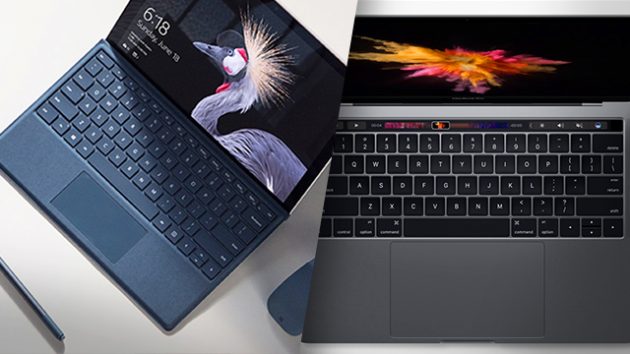Smartphones and iPads may be in the lead, but it is still very much a Mac Vs. PC world.

Some things never change. A say that rings very much true in the digital age.
Communication and compatibility across same typologies of devices, but manufactured by different companies, is very much dependent on the willingness of competing tech giants to collaborate, pending patent hurdles and agreements.
Sharing files between an iPhone and an Android device is something that while most of us take for granted, it’s the result of fragile agreements and compromises, mostly learned at the expenses of past mistakes, such as Microsoft’s antitrust troubles, spanned across two decades, during which the company nearly followed in the footsteps of AT&T, coming close to being forced to split into separate entities in the wake of the now forgotten “browser wars” with Netscape.
Come 2018, one would think that the old diatribe between Mac and PC users should be a thing of the past, but it’s anything but, and sadly, due to a very important reason.
The browser wars may be long gone, but the much more subtle “file system wars”, still rage on, between Mac users and Windows PC users. To fuel the fire, is the natural evolution of operating systems whose development prioritizes security and stability, as it should be. Those who have formatted an external drive on a Mac, tend to do so, using Apple’s own file system, APFS+ Journaled, an option available for those who want the best security for their data, which comes at the unfortunate expense of compatibility. Windows 10 PCs, as well as any previous versions of Microsoft Windows, will not be able to read volumes formatted using Apple’s proprietary method, unless special paid software is purchased for the purpose.
Microsoft, of course, does the exact same thing with its own NTFS file system, a legacy of Windows NT, and historically incompatible with Mac OS.
Currently there is only one operating system that can read and write using both NTFS and APFS, which is Linux. The only other way to maintain complete compatibility across devices is to use “exFAT”, when formatting a new drive. exFAT is a file system developed by Microsoft in 2006. exFAT was created to be extremely versatile and optimized for flash memory, such as SSD and thumb drives. Many hard drives on popular Android smartphones and tablets use exFAT as their file system, which is what makes it easy for them to connect and be read across multiple operating systems.
The downside of using exFAT on a Mac, is that unmounting an exFAT drive is historically daunting and prone to errors. Sadly, that is the only feasible solution for those who want to share a drive across different operating systems.
The lack of motivation from companies like Microsoft and Apple to come to a common ground when it comes to file systems, is partly to be blamed on the raise of cloud storage, which allows ubiquitous access to files stored on the Internet. Wireless access has reached tremendous speeds, to a point where there is little difference between accessing files on a local hard drive, or on an online service like Google Drive or iCloud.
The rise of ARM-based laptops, once thought as a gimmick, barely powerful enough for a Chromebook, is now indicating that the future belongs to smaller drives, and faster access speeds, not to mention shared/remote processing, which means that individual consumer laptops and other computers will no longer need powerful processors and tons of storage to fit the needs of the average user, but will rather rely increasingly on wireless data storage, and network processing, in a similar way as crypto-miners use shared resources online to enhance their hardware resources, legally of course.
Ready to shop?
Looking for the most powerful desktop created by Apple? PortableOne is where you can buy the All-New Apple iMac Pro a production powerhouse for high-end creative professionals, with endless possibilities, and unprecedented specs.